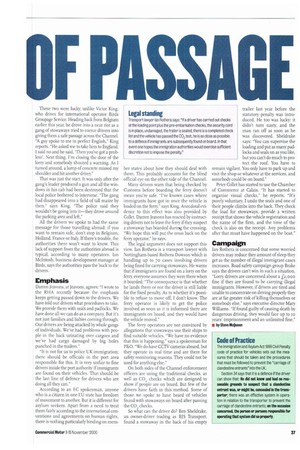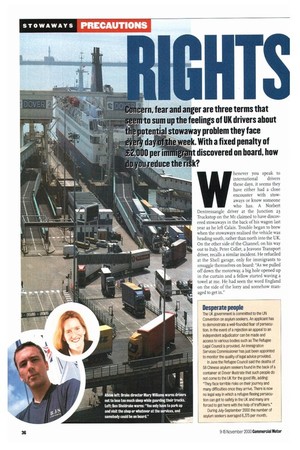F PA SS A
Page 39

Page 38

If you've noticed an error in this article please click here to report it so we can fix it.
rn, fear and anger are three terms that to sum up the feelings of UK drivers about ote tial stowaway problem they face
da r eek. With a fixed penalty of utill t discovered on board, how
000 per im
11111 henever you speak to international drivers these days, it seems they have either had a close encounter with stowaways or know someone who has. A Norbert Dentressangle driver at the Junction 23 Truckstop on the Mr claimed to have discovered stowaways in the back of his wagon last year as he left Calais. Trouble began to brew when the stowaways realised the vehicle was heading south, rather than north into the UK. On the other side of the Channel, on his way out to Italy, Peter Collet, a Jeavons Transport driver, recalls a similar incident. He refuelled at the Shell garage, only for immigrants to smuggle themselves on board: As we pulled off down the motorway, a big hole opened up in the curtain and a fellow started waving a towel at me. He had seen the word England on the side of the lorry and somehow managed to get in."
These two were lucky, unlike Victor King, who drives for international operator Birds Groupage Service. Heading back from Belgium earlier this year, he drove into a near riot as a gang of stowaways tried to coerce drivers into giving them a safe passage across the Channel. "A guy spoke to me in perfect English," King reports. "He asked me to take him to England. I said no and he said, 'Then you've got a problem'. Next thing, I'm closing the door of the lorry and somebody shouted a warning. As I turned around, a lump of concrete missed my shoulder and hit another driver."
That was just the start. It was only after the gang's leader produced a gun and all the windows in his cab had been destroyed that the local police bothered to intervene. "The gang had disappeared into a field of tall maize by then," says King. "The police said they wouldn't be going into it—they drove around the parking area and left."
All the drivers we spoke to had the same message for those travelling abroad: if you want to remain safe, don't stop in Belgium, Holland, France or Italy. If there's trouble, the authorities there won't want to know. This lack of support from the authorities abroad is typical, according to many operators. Ian McIntosh, business development manager at Birds, says the authorities pass the buck to the drivers.
Emphasis
Darren leavens, at Jeavons, agrees: "I wrote to the R HA recently because the emphasis keeps getting passed down to the drivers. We have told our drivers what procedures to take. We provide them with seals and padlocks. We have done all we can do as a company. But it's not just families and babies coming through. Our drivers are being attacked by whole gangs of individuals. We've had problems with people in the back urinating over cargoes and we've had cargo damaged by big holes punched in the trailers."
"It is not for us to police UK immigration; there should be officials in the port area responsible for this. It is very unfair to fine drivers inside the port authority if immigrants are found on their vehicles. That should be the last line of defence for drivers who are doing all they can."
According to an EC spokesman, anyone who is a citizen in one EU state has freedom of movement to another. But it is different for asylum seekers, Apart from a need to treat them fairly according to the international conventions and agreements on human rights, there is nothing particularly binding on mem
her states about how they should deal with them. This probably accounts for the blind official eye on the other side of the Channel.
Many drivers warn that being checked by Customs before boarding the ferry doesn't mean you're safe. "I've known cases where immigrants have got in once the vehicle is loaded on the ferry," says King. Anecdotal evidence to this effect was also provided by Collet. Darren Jeavons has reacted by instructing drivers not to leave the ferry if they suspect a stowaway has boarded during the crossing. "We hope this will put the onus back on the ferry operator," he says.
The legal argument does not support this view, Ian Rothera is a transport lawyer with Nottingham-based Rothera Dowson which is handling up to 70 cases involving drivers being fined for carrying stowaways. He warns that if immigrants are found on a lorry on the ferry everyone assumes they were there when it boarded: "The consequence is that whether he lands them or not the driver is still liable for the fixed penalty. As to whether it's possible to refuse to move off, I don't know. The ferry operator is likely to get the police involved as soon as it is informed there are immigrants on board, and they would have the vehicle moved."
The ferry operators are not convinced by allegations that stowaways use their ships to find suitable vehicles. "We have no evidence that this is happening," says a spokesman for P&O. "We do have CCTV cameras aboard, but they operate in real time and are there for safety monitoring reasons. They could not be used for anything else."
On both sides of the Channel enforcement officers are using the traditional checks, as well as CO2 checks which are designed to show if people are on board. But few of the drivers have faith in this method. Some of those we spoke to have heard of vehicles found with stowaways on board after passing the CO2 checks.
So what can the driver do? Ben Sheldrake, an owner-driver trading as BIS Transport, found a stowaway in the back of his empty
trailer last year before the statutory penalty was introduced. He too was lucky: it didn't turn nasty, and the man ran off as soon as he was discovered. Sheldrake says: "You can supervise the loading and put as many padlocks and seals on as you like, but you can't do much to protect the roof. You have to remain vigilant. You only have to park up and visit the shop or whatever at the services, and somebody could be on board."
Peter Collet has started to use the Chamber of Commerce at Calais. "It has started to organise visual checks," he reports. "It's purely voluntary. I undo the seals and one of their people climbs into the back. They check the load for stowaways, provide a written receipt that shows the vehicle registration and the name of the firm, and the time of the check is also on the receipt. Any problems after that must have happened on the boat."
Ian Rothera is concerned that some worried drivers may reduce they amount of sleep they get as the number of illegal immigrant cases increases. Road safety campaign group Brake says the drivers can't win in such a situation. "Lorry drivers are concerned about a £2,000 fine if they are found to be carrying illegal immigrants. However, if drivers are tired and unable to concentrate on driving properly they are at far greater risk of killing themselves or somebody else," says executive director Mary Williams. "If found guilty oFcausing death by dangerous driving, they would face up to to years' imprisonment and an unlimited fine,"
• by Steve McQueen




































































































